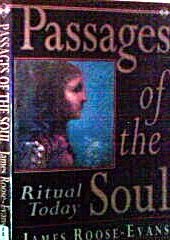Passages Of The Soul: James Roose-Evans, Element Books, 1994
 The title of this book refers to the transitions, or passages, that occur between the various phases of ones life, and the fact - as stated in the cover notes - that "in our modern world... our own celebration of these fundamental events often amounts to no more than brief, superficial ceremonies", if they happen at all, which in most cases they don't. The author holds that "ritual is an essential part of a balanced, meaningful life".
The title of this book refers to the transitions, or passages, that occur between the various phases of ones life, and the fact - as stated in the cover notes - that "in our modern world... our own celebration of these fundamental events often amounts to no more than brief, superficial ceremonies", if they happen at all, which in most cases they don't. The author holds that "ritual is an essential part of a balanced, meaningful life".
Roose-Evans, now 86, was a theatre director of some renown with a number of impressive productions, initiatives, books and collaborations to his credit. In this book he writes about his experiences working mainly with young actors and dancers coming through their education in the USA of the 50s and 60s.
In the opening chapter he sets the stage, drawing on the ideas of Carl Jung, Joseph Campbell and Meister Eckhart. The inner world is just as real as the outside world. "If we are in Tao - that place where all opposites are united - we have an inexplicable effect on our surroundings." This is all good stuff, which fills the reader with excitement and anticipation as he turns to chapter 2.
This is where it all falls down. The whole of the rest of the book is concerned in one way or other with exercises in self-expression for those in the performing arts. Roose-Evans, an inveterate man of the theatre, has fallen into the trap of mistaking theatre-land for the real world. The groups participating in his sessions are required to make meaningful gestures in a rope circle, to spontaneously express their feelings using only their hands or by carrying a bundle of bamboo canes and dropping them. We are told in ecstatic terms of how a singing group established a rapport with a remote African tribe by singing "ah" very loudly. For actual or aspiring performers this must surely be gripping stuff; for the rest of us, the most we can hope for is a fascinating insight into the thespian mentality.
If this had been intended as a primer in expressive dance it would have been a success. Since it set out to be about rite-of-passage rituals it has entirely missed its purpose. We read that you can't just make up a new ritual, that it has to arise from the collective unconscious to be truly meaningful. There follows a list of made-up rituals, some improvised. Roose-Evans seems oblivious to his own pomposity. He tells of how a woman once told him she was going to use his ritual in her workshops: "I was struck speechless because it is an exercise that requires handling with skill and sensitivity".
In fact there are sections and paragraphs here and there that on their own make the book worth looking at for anyone trying to make sense of life. If my criticism is harsh it is only through disappointment; it could have been so much better.